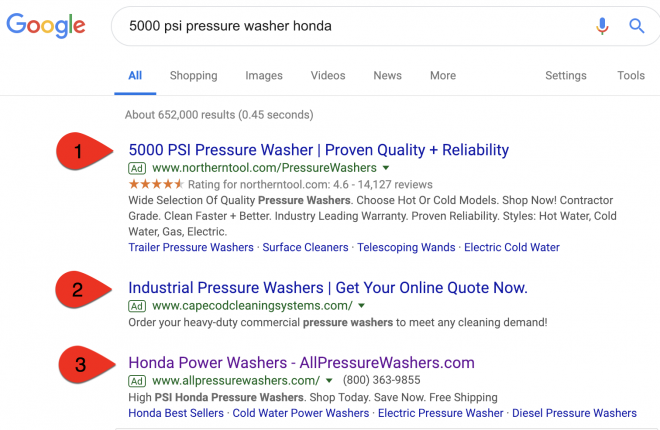At the heart of every paid search campaign lies the eternal question: Why do people click (or not click) on your paid search ads?
Is it because they recognize the brand that’s advertised? Is it because the ad includes the information they’re seeking?
Or is it simply that the ad is at the right place at the right time?
Figuring out why people click (or don’t click) has become increasingly difficult as ads become more complex.
After all, it wasn’t many years ago that text ads had one headline and a simple two line description.
Today, we have multiple headlines and descriptions available to us—not to mention a dozen extensions to mix and match.

As a result, PPC pros need to be more deliberate in their strategies. (An argument I made recently as part of my expert predictions for PPC in Search Engine Journal.)
One way to boost your understanding of “why people click on ads” is to look at research that’s been done on the topic.
And recently, I came across an interesting article that provides some helpful analysis.
It’s titled “Search Engine Marketing: Why People Click on Paid Search Ads” in Clutch.co.
Here are a few of the findings along with my thoughts:
More than one-quarter of people (26%) click on a paid search ad because it mentions a brand they are familiar with.
Our experience corroborates this finding. Brand name recognition is powerful in advertising, and paid search is no exception.
We often leverage brand name power by pairing the brand name with “official site” messaging for an effective one-two punch.
This combo works well because it communicates to users that the click-through site doesn’t just carry products of that brand, but is the official site for that brand.
It’s the difference between a site that carries Nike products—and the official Nike website itself.
People are most likely to click on text paid search ads (49%) instead of shopping/product listing ads (31%) and video ads (16%).
This finding was more surprising. I’m not sure why people are more inclined to click on text ads than other types. Maybe it’s because text ads are more familiar to people. Or maybe text ads are simply more available.
Regardless, it’s a useful finding. For example, we have some clients that only want to run Shopping campaigns. This finding might encourage them to run a combination of ad types.
About four times as many people are more likely to click on a paid search ad on Google (63%) than on any other search engine – Amazon (15%), YouTube (9%), and Bing (6%).
This difference can be explained by Google’s dominance. Clearly, it’s THE place people go when they need to find something online.
But again, it’s a good reminder to carefully consider the advertising platforms you use.
For example, we met a prospective client recently that only advertises on Amazon. Google is something they might also want to consider.
One-third of people (33%) click on a paid search ad because it directly answers their search query.
This finding is music to our ears!
We always pay careful attention to our ad messaging to try and match it to search queries.
Three-fourths of people (75%) say paid search ads make it easier to find the information they are searching for on a website or search engine.
Again, yes! When it’s done well, paid search ads help users find what they’re looking for.
Unfortunately, when paid search isn’t done well, users are served irrelevant ads, which gets annoying quickly.
But when ads ARE closely matched to search queries, it’s magic!
Here’s an example:

Here, we searched “5000 psi pressure washer honda.”
And these three ads impressioned.
The first one is for… a “5000 PSI Pressure Washer.” Yay! This is a great match for our search query. The only element that’s missing is the Honda brand name. But if you were searching for a 5000 PSI pressure washer, you’d probably click on this ad because it directly addresses your query.
The second ad is for an “Industrial Pressure Washer.” Hmmm. This one is a little further from the mark. It contains neither the brand name nor the PSI rating. However, a 5000 PSI is pretty high and likely meant for industrial purposes—so it’s still in the ballpark.
The third ad is for a “Honda Power Washer.” That’s still pretty close. It doesn’t specify 5000 PSI, but it does have “high PSI” in the body copy.
Have these three ads made it easier for people to find what they’re looking for? You bet!
And so they’re much more likely to click.
Get More People to Click on Your Ads
Of course, getting more ad clicks isn’t the whole objective. What you really want are more conversions and better results.
But the more you understand why people click, the more you can use that information to make better ads—and better ad campaigns.






